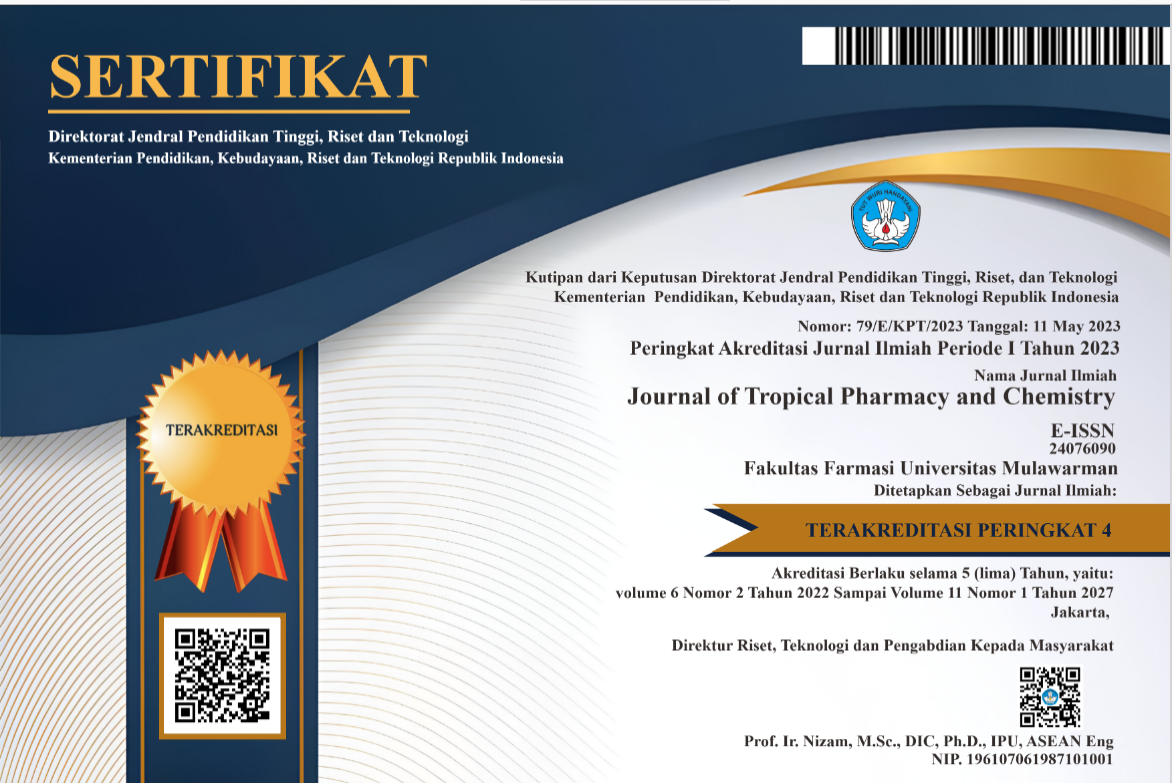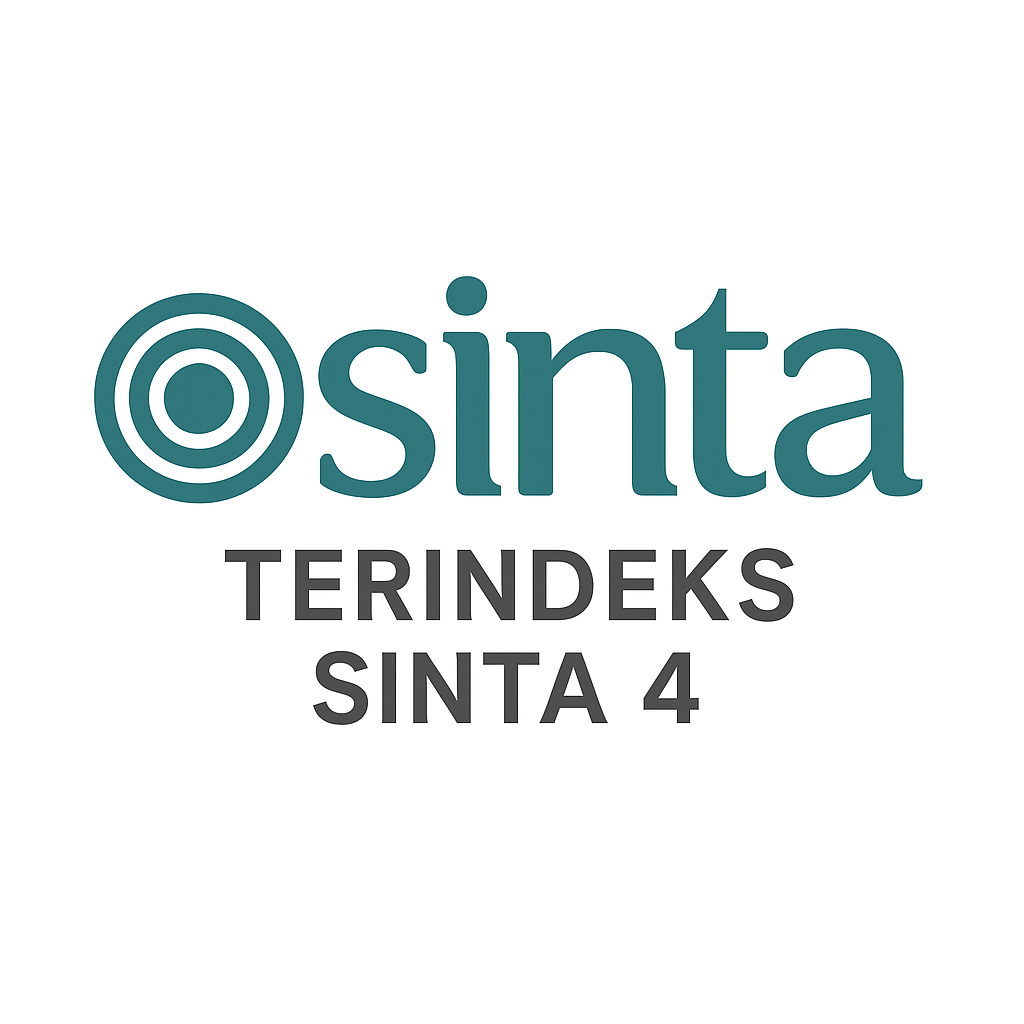Student Self-Medication Behavior in Stress Handling
DOI:
https://doi.org/10.30872/j.trop.pharm.chem.v6i2.244Keywords:
stress, self-medication, studentAbstract
Changing learning patterns from senior high school student to college student status is difficult, and each individual's response varies, some of which cause stress. Factors that cause stress are internal and external, and external factors consist of physical, conflict, emotional, and behavioral conditions. In comparison, the external factors consist of the physical environment, work environment, community environment, family environment, economic and legal problems. The burden of life stress is heavy and impacts the physical, such as feeling dizzy, nauseous, ulcers, and difficulty sleeping. Sometimes causes a person to take self-medication to overcome these uncomfortable symptoms. This study aims to determine the characteristics of early-level students and the stress level of early-level students at one of the State Universities of East Kalimantan Province. This study used a qualitative descriptive design on 121 students. Using a questionnaire through a cross-sectional approach with a purposive sampling technique. The results showed that the stress level of students showed mild stress as much as 30.58%, moderate stress at 56.20%, and severe stress as much as 13.22%. The number of students who did self-medication was more than those who did not provide treatment for the symptoms, 79.34%.
Downloads
References
Habeeb, Kholoud Abdulrahman. (2010). Prevalence of Stresors among Female Medical Students. Journal of Taibah University Medical Sciences 2010; 5(2): 110 – 119
Fitasari, Isna Nur. (2011). Faktor yang Berhubungan dengan Kejadian Stres pada Mahasiswa Fakultas Kesehatan Masyarakat Universitas Airlangga. Surabaya: FKM Airlangga.
Goff, A.M. (2011). Stresor, Academic performance and learned resourcefulness inbaccalaureate nursing student. International Journal of Nursing Education Scholarship. 923 – 154
Hurlock., (2008) : Psikologi perkembangan suatu pendekatan sepanjang rentang kehidupan, 5th ed., Erlangga, Jakarta. 320-336.
WHO (2000) Guidelines for the Regulatory Assessment of Medicinal Products for Use in Self-Medication, Geneva.
Adhikary, M., Tiwari, P., Singh, S., and Karoo, C. (2014). Study of selfmedication practices and its determinant among college students of Delhi University North Campus, New Delhi, India. International Journal of Medical Science and Public Health, 3(4), 406-409.
Hofmeister EH, Muilenburg JL, Kogan L, Elrod SM. (2010). Over-the-counter stimulant, depressant, and nootropic use by veterinary students. J Vet Med Educ, 37(4):403-16.
James H, Handu SS, Al Khaja KA, Otoom S, Sequeira RP. (2006). Evaluation of the knowledge, attitude and practice of self-medication among first-year medical students. Med Princ Pract, 15(4):270-5.
Smeltzer, S.C.dan Bare, B. G. (2008). Brunner And Sudarth’s textbook of medicalsurgical nursing. Jakarta: EGC.
Sugiarto, D (2012). Hubungan Kecerdasan Dengan Daya Tahan Stres Mahasiswa UIN Sunan Kalijaga Yogyakarta.Skripsi.ha1-19
Lei, X., Jiang, H., Liu, C., Ferrier, A., & Mugavin, J. (2018). Self-Medication Practice and Associated Factors among Residents in Wuhan, China. International Journal of Environmental Research and Public Health, 15(1), 68.
Kaplan, H., & Sadock, B. (2005). Sinopsis Psikiatri Ilmu Pengetahuan Prilaku Psikiatri Klinis. Binarupa Aksara. Jakarta.
Sutjiato, Margareth, Kandou, G. D., Tucunan, A. A. T. (2015). Hubungan Faktor Internal dan eksternal Dengan Tingkat Stres PadaMahasiswa Fakultas Kedokteran Universitas Samratulangi Manado. Artikel ilmiah.Manado: Faculty of Public Health, Sam Ratulangi University, Manado.
Sundari, J. (2012). Hubungan Antara Tingkat Stres Dengan Intensitas Olahraga Pada Mahasiswa Reguler 2008 Fakultas Matematika dan Ilmu Pengetahuan Alam Universitas Indonesia. Thesis. Depok: Faculty of Nursing Indonesia University.
Pathmanathan, V & Husada, S.(2013). Gambaran Tingkat Stres Pada Mahasiswa Fakultas Kedokteran Universitas Sumatera Utara Semester Ganjil TahunAkedemik 2012/2013. EJournal Faculty of Medicine University of Nort Sumatra Vol. 1 No.1, 2013
Nursalam. (2008). Konsep Dan Penerapan Metodologi Penelitian Ilmu keperawatan. Ed 2. Jakarta: Salemba Medika
M. Hughes, Carmel & C. McElnay, James & Fleming, Glenda. (2001). Benefits and Risks of Self Medication. Drug safety : an international journal of medical toxicology and drug experience.
Asseray N, Ballereau F, TrombertPaviot B, Bouget J, Foucher N, Renaud B et al. Frequency and severity of adverse drug reactions due to selfmedication: a cross-sectional multicenter survey in emergency departments. 2013;36:1159- 68.
Burute, S. R., Burute, R. B., Murthy, M. B., Karande, V. B., Pore, S. M., & Ramanand, S. J. (2016). Awareness of adverse drug reactions in third MBBS students practicing self-medication. International Journal of Basic & Clinical Pharmacology, 5(1), 196-201.
Schmiedl S, Rottenkolber M, Hasford J, Rottenkolber D, FarkerK, Drewelow B, et al. Self-medication with over-thecounterand prescribed drugs causing adverse drug-reaction-related hospital admissions: results of a prospective, long term multicentre study. 2014;37:225—35.
Montastruc, J. L., Bondon-Guitton, E., Abadie, D., Lacroix, I., Berreni, A., Pugnet, G., & Montastruc, F. (2016). Pharmacovigilance, risks and adverse effects of self-medication therapiy, 71(2), 257-262.
Downloads
Published
Issue
Section
License
Copyright (c) 2022 Risna Agustina, Ronny Lesmana, Neily Zakiyah, Siti Nuriyatus Zahrah, Ajeng Diantini (Author)

This work is licensed under a Creative Commons Attribution-NonCommercial 4.0 International License.




